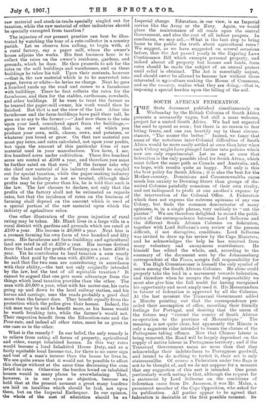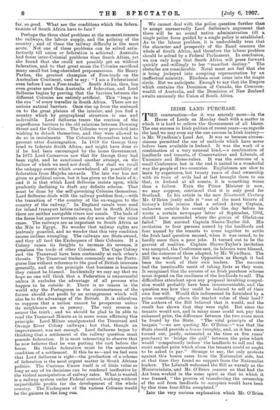SOUTH AFRICAN FEDERATION.
11HE State document published simultaneously on Wednesday by the British Colonies of South Africa presents a necessarily vague, but still a most welcome, project for a united South Africa. We had not expected the seed to sprout so soon; but there is no reason to fear biting frosts, and one can heartily say in these circum- stances, "The sooner the better." Indeed, we fancy that some of the notorious inter. Colonial difficulties of South Africa would be more easily settled at once than later when each Colony might have plunged farther into policies which now are only experimental. Let us say at once that federation is the only possible ideal for South Africa, which must follow the same path as Canada and Australia, and, we hope, with results quite as happy. Not only is this the best policy for South Africa; it is also the best for the Mother-country. Dominions and Commonwealths cause much less anxiety to Downing Street than groups of dis- united Colonies painfully conscious of their own rivalry, and not indisposed to profit at one another's expense by the intervention of the Colonial Office. A Federation which does not express the extreme opinions of any one Colony, but finds the common denominator of many opinions, is, in a single phrase, very unlikely to "cut the painter." We are therefore delighted to record the publi- cation of the correspondence between Lord Selborne and. the different South African Colonies on federation, together with Lord Selborne's own review of the present difficult, if not disruptive, conditions. Lord Selborne was invited to draw up his review by the Cape Ministers, and he acknowledges the help he has received from many voluntary and anonymous contributors. He himself has edited the whole, and, according to the summary of the document sent by the Johannesburg correspondent of the Times, accepts full responsibility for it. The High Commissioner is himself the only symbol of union among the South African Colonies. He alone could properly take the lead in a movement towards federation, and therefore when he accepts the full responsibility we must also give him the full credit for having recognised his opportunity and most amply used it. His Memorandum in favour of federation is approved by all the Colonies. At the last monient the Transvaal Government added a Minute pointing out that the correspondence pre- ceded their assumption of office, recording their friendly feelings for Portugal, and desiring that the union of the future may "extend the comity of South African co-operation to the province of Mozambique." The meaning is not quite clear, but apparently the Minute is only a sagacious rider intended to lessen the chance of the Portuguese taking offence. Now that Chinese labour is being removed, the Rand will be largely dependent on the supply of native labour in Portuguese, territory ; and if the Transvaal Government mean no more than that they acknowledge their indebtedness to Portuguese goodwill, and intend to do nothing to forfeit it, their act is only statesmanlike. Of course a Federation under two flags is not to be thought of, and we do not suppose for a moment that any suggestion of this sort is intended. One point particularly worth noting is that, although the request for a statement by Lord Selborne on the conditions of federation came from Dr. Jameson, it was Mr. Malan, a prominent member of the Cape Opposition, who asked for its publication. All parties appear to be agreed that federation is desirable at the first possible moment. So far, so good. What are the conditions which the federa- tionists of South Africa have to face ?
Perhaps the three chief problems at the moment concern the railways, the labour supply, and the policing of the country ; and of these the railway difficulty is the most acute. Not one of these problems can be solved satis- factorily till union or federation is achieved. Australia bad fewer inter-Colonial problems than South Africa, yet she found that she could not possibly get on without federation, and to that great cause the Colonies sacrificed many small but long-cherished prepossessions. Sir Henry Parkes, the greatest champion of Free-trade on the Australian Continent, used to say : "I am a Federationist even before I am a Free-trader." South Africa, then, has even greater need than Australia of federation, and Lord Selborne begins by proving that the barriers between the different Colonies are entirely artificial. This "leaps to the eye" of every traveller in South Africa. There are no serious natural barriers. Once rise up from the seaboard on to the great plateau of the interior, and you find a country which by geographical structure is one and indivisible. Lord Selborne traces the erection of the superfluous barriers to the old relations between Downing Street and the Colonies. The Colonies were provoked into wishing to detach themselves, and they were allowed to do so in instalments. The Colonists themselves tried to prevent utter disintegration. In 1859 Sir George Grey tried to federate South Africa, and might have done so if he had been encouraged by the home Government. In 1875 Lord Carnarvon saw that Sir George Grey had been right, and he sanctioned another attempt, on the failure of which we need not dwell. Nor shall we recall the unhappy events which overwhelmed all possibility of federation from Majuba, onwards. The late war has not given us political union, but it has given us the basis of it ; and it is that which Lord Selborne insists upon, while prudently declining to draft any definite scheme. That must be done by the self-governing Colonies themselves. Lord Selborne deals with the railway problem first,—with the transition of "the country of the ox-waggon to the country of the railway." In England canals were used for inland transport before railways, but in South Africa there are neither navigable rivers nor canals. The beds of the fierce but narrow torrents are dry soon after the rains cease. The railways are as important to South Africa as the Nile to Egypt. No wonder that railway rights are jealously guarded, and no wonder that this very condition causes endless wrangling. The railways are State-owned, and they all feed the Exchequers of their Colonies. If a Colony raises its freights to increase its revenue, it penalises the trade of other Colonies. The Cape Colony and the Transvaal have been continually at each other's throats. The Transvaal traders commonly use the Portu- guese line without reference to the good of British interests generally, and on the principle that business is business they cannot be blamed. Incidentally we may say that we hope no one will think that a Federation is unsuccessful unless it excludes the advantage of all persons who happen to be outside it. There is no reason in the world why the Portuguese in the circumstances of the future should not profit by an arrangement which will also be to the advantage of the British. It is ridiculous to suppose that a nation cannot be prosperous unless its neighbours are in penury. The very reverse is nearer the truth ; and we should be glad to be able to read the Transvaal Minute as in some sense affirming this principle. Lord Milner amalgamated the Transvaal and Orange River Colony railways ; but that, though an improvement, was not enough. Lord Selborne began by thinking that a settlement of the railway question must precede federation. It is most interesting to observe that he now believes that he was putting the cart before the horse. He thinks federation must be the antecedent condition of a settlement. If this be so—and we feel sure that Lord Selborne is right—the production of a scheme of federation is the most urgent matter in South African politics. The Customs Union itself is of little value so Tong as any of its decisions can be rendered ineffective by the violent manipulation of railway rates. What is wanted is a railway system under Federal control, working without unjustifiable profits for the development of the whole country. The Exchequers of the various Colonies would be the gainers in the long run. We cannot deal with the police question further than to accept unreservedly Lord Selborne's argument that there will be no sound native administration till a single police force guided by a single policy is established. As to the labour problem, it is undoubtedly true that the character and prosperity of the Rand concern the whole of South Africa, and therefore the labour problem should be solved by a'Federal Parliament. In conclusion, we can only hope that South Africa will press forward quickly and .willingly to her "manifest destiny." The obstacles are considerable. Natal must not feel that she is being jockeyed into accepting representation by an ineffectual minority. Rhodesia must come into the magic circle. Bat we anticipate. Enough to say that the Empire which contains the Dominion of Canada, the Common- wealth of Australia, and the Dominion of New Zealand awaits anxiously the Union of South Africa.















































 Previous page
Previous page